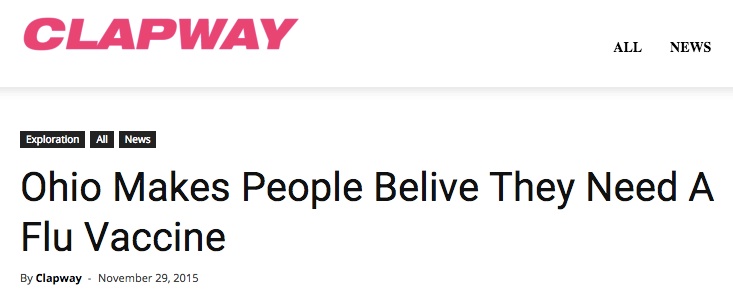An ongoing dialogue on HIV/AIDS, infectious diseases,
November 29th, 2015
Flu Vaccine Keeps Taking Hits, Still the Best We’ve Got — Don’t Stop “Belivin'” [sic]
For reasons understood only by the geniuses in Mountain View, CA, for some reason my Google news feed picked up this bit of “scientific” reporting:
Let me allow the author, an unfortunately named “Clapway” (gonorrhea researcher?), to speak for him/herself:
However, is the flu vaccine really worth it? The author of this article never takes it and has not had the flu in years, knock on wood. There have also been various stories around the web that have stated that people who get the vaccine, immediately get the flu. It then has to be considered that the flu vaccine can be risky to take.
Is this an Onion parody? Or did Google stumble on a Junior High School science/tech blog? If so, a brief word of advice to the author — always double-check spelling (especially the title) before posting.
Admittedly, the recent news on the flu vaccine hasn’t been great — a rehash of reduced effectiveness from repeated immunizations (data are from a study published last year), how poorly the vaccine protects against H3N2, and a study suggesting that statins reduce vaccine efficacy. Of course people taking statins (cardiovascular risk, older) are exactly the people we want to get the vaccine!
On the good news front, we have yet another FDA-approved flu vaccine, this one with the wonderfully named adjuvant squalene to boost immune response. And boy does this new vaccine have a strange-looking brand name — “Fluad.” Good grief. Add it to the zillions of other flu vaccines available — just choose one!
Other good news: This year’s vaccine seems to match the circulating flu virus much better than last year. Cautious optimism.
So warts notwithstanding, until the “universal” flu vaccine is available, the current annual vaccine (in all its various permutations) is the best we’ve got. Even during last year’s dismal performance, there’s some evidence it prevented flu-related illness severe enough to cause hospitalization.
Wise words here from ID colleague Dr. Larry Madoff, who is Director of Epidemiology and Immunization at the Massachusetts Department of Public Health.
Good enough for me.
[youtube http://www.youtube.com/watch?v=VcjzHMhBtf0&w=420&h=315]


Once again, nothing about influenza virus infection and replication in ciliated columnar epithelial cells of the respiratory mucosa. Natural infection elicits IgA, IgG and IgM. Nothing about IM injections and IgA. IgA would afford protection in the respiratory epithelium. IM injections elicit IgG and IgM. It is a small wonder the vaccine works at all (see http://www.anvita.info/wiki/Influenza_Virus_Vaccine). Perhaps like Pneumovax, the influenze virus vaccine prevents viremia. But there is nothing about this, This is the same old sales pitch. I guess we should never let science get in the way of advertising. Think of the missed opportunities (to make money),
Sheldon,
I’ve been pretty critical of the currently available flu vaccines. (Read this.) Still think it’s the best we have (for now).
Paul
Hi Paul,
I had previously read that blog. It seems that none of this discussion comes to grips with why the vaccine does not work well. Until a vaccine that provides IgA within the respiratory epithelium is available, we will continue to face the dilemma of how much of current recommendations are driven by financial incentives?
Here are my suggestions for discussions on the flu vaccines.
1. Discuss the pathology in influenza viruses, how infections are transmitted and where the viruses replicate.
2. Discuss the development of immunity to respiratory tract infections.
3. Discuss the benefits and limitations of current vaccines.
4. Discuss potential financial incentives that can influence recommendations.
Sheldon Ball, PhD, MD
Board Certified: Internal Medicine, Geriatrics, Clinical pathology